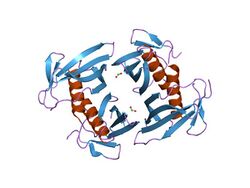Biology:Palmitoyl-CoA hydrolase
| palmitoyl-CoA hydrolase | |||||||||
|---|---|---|---|---|---|---|---|---|---|
| Identifiers | |||||||||
| EC number | 3.1.2.2 | ||||||||
| CAS number | 9025-87-0 | ||||||||
| Databases | |||||||||
| IntEnz | IntEnz view | ||||||||
| BRENDA | BRENDA entry | ||||||||
| ExPASy | NiceZyme view | ||||||||
| KEGG | KEGG entry | ||||||||
| MetaCyc | metabolic pathway | ||||||||
| PRIAM | profile | ||||||||
| PDB structures | RCSB PDB PDBe PDBsum | ||||||||
| Gene Ontology | AmiGO / QuickGO | ||||||||
| |||||||||
Palmitoyl-CoA hydrolase (EC 3.1.2.2) is an enzyme in the family of hydrolases that specifically acts on thioester bonds. It catalyzes the hydrolysis of long chain fatty acyl thioesters of acyl carrier protein or coenzyme A to form free fatty acid and the corresponding thiol:
- palmitoyl-CoA + H2O = CoA + palmitate
It has a strict specificity for thioesters with a chain link greater than C10.
These enzymes are localized in almost all cellular compartments, such as endoplasmic reticulum, cytosol, mitochondria, and peroxisomes. They are highly regulated by peroxisome proliferator activated receptors, which led to their involvement in lipid metabolism. The enzyme is up-regulated during times of increased fatty acid oxidation, which suggests that this enzyme has a potential role the peroxisomal beta-oxidation.
The systematic name is palmitoyl-CoA hydrolase. Other names in common use include long-chain fatty-acyl-CoA hydrolase, palmitoyl coenzyme A hydrolase, palmitoyl thioesterase, palmitoyl coenzyme A hydrolase, palmitoyl-CoA deacylase, palmityl thioesterase, palmityl-CoA deacylase, fatty acyl thioesterase I, and palmityl thioesterase I.
Structural studies
As of late 2007, 3 structures have been solved for this class of enzymes, with PDB accession codes 1TBU, 2Q2B, and 2QQ2.
Mechanism
At a subcellular level, palmitoyl-CoA hydrolase is localized in the endoplasmic reticulum, cytosol, mitochondria, and peroxisomes. Studies have shown that in rats that are fed high fat diets, palmitoyl-CoA hydrolase activity in the liver increased. While the details of the mechanism are not known, the results suggest that there is an "induction" mechanism taking place for palmitoyl-CoA hydrolase and peroxisomal beta-oxidation enzymes.
Disease Relevance
Diabetes is the most common cause of liver disease in the U.S., type 2 diabetes. Studies have been done to show that, while there is not direct correlation between palmitoyl-CoA hydrolase and diabetes, streptozotocin-induced diabetes significantly decreased rat liver palmitoyl-CoA hydrolase. This led to high levels of fatty acyl-CoA being present in the liver, which shows that a diseased liver cannot regulate the amount of fatty acyl-CoA that is present versus a normal, healthy liver. A defect in acyl-CoA degradation in livers can produce hyperammonemia and hypoglycemia.
References
- Barnes EM Jr; Wakil SJ (1968). "Studies on the mechanism of fatty acid synthesis. XIX. Preparation and general properties of palmityl thioesterase". Journal of Biological Chemistry 243 (11): 2955–62. doi:10.1016/S0021-9258(18)93365-X. PMID 4871199.
- "Long-chain fatty acyl-CoA hydrolase from rat liver mitochondria". Lipids Part C. Methods in Enzymology. 71. 1981. pp. 234–42. doi:10.1016/0076-6879(81)71030-9. ISBN 9780121819712.
- "Induction of a novel long-chain acyl-CoA hydrolase in rat liver by administration of peroxisome proliferators". European Journal of Biochemistry 117 (2): 425–30. 1981. doi:10.1111/j.1432-1033.1981.tb06356.x. PMID 6115749.
- "Palmityl coenzyme A deacylase". Biochimica et Biophysica Acta 33 (2): 313–319. 1959. doi:10.1016/0006-3002(59)90118-0. PMID 13670899. https://deepblue.lib.umich.edu/bitstream/2027.42/32457/1/0000541.pdf.
- Yabusaki KK; Ballou CE (1981). "Long-chain fatty acyl-CoA thioesterases from Mycobacterium smegmatis". Lipids Part C. Methods in Enzymology. 71. pp. 242–246. doi:10.1016/0076-6879(81)71031-0. ISBN 978-0-12-181971-2.
- "Rapid stimulation of liver palmitoyl-CoA synthetase, carnitine palmitoyltransferase and glycerophosphate acyltransferase compared to peroxisomal β-oxidation and palmitoyl-CoA hydrolase in rats fed high-fat diets". Biochimica et Biophysica Acta (BBA) – Lipids and Lipid Metabolism 960 (3): 417–26. 1988. doi:10.1016/0005-2760(88)90050-1. PMID 2898261.
- "Effects of high fat diets on the activity of palmitoyl-CoA hydrolase in rat liver". Lipids 20 (1): 49–52. 1985. doi:10.1007/bf02534363. PMID 2857471..
- "Purification and Characterization of Long-Chain Acyl-CoA Hydrolase from Rat Liver Mitochondria". FEBS Journal 96 (2): 393–401. 1979. doi:10.1111/j.1432-1033.1979.tb13051.x. PMID 37085.
- "Studies of the Mechanism of Fatty Acid Synthesis". Journal of Biological Chemistry 243 (11): 2955–2962. 1968. doi:10.1016/S0021-9258(18)93365-X.
- "Spectrum of Liver Disease in Type 2 Diabetes and Management of Patients with Diabetes and Liver Disease". Diabetes Care 30 (3): 734–743. 2007. doi:10.2337/dc06-1539. PMID 17327353.
- "Effects of Streptozotocin-Induced Diabetes on Microsomal Long-Chain Fatty Acyl-CoA Synthetase and Hydrolase". Lipids 19 (8): 578–582. 1984. doi:10.1007/bf02534714. PMID 6148682.
- "Biochemical and Molecular Characterization of ACH2, an Acyl-CoA Thioesterase from Arabidopsis thaliana". Journal of Biological Chemistry 279 (9): 7487–7494. 2004. doi:10.1074/jbc.M309532200. PMID 14660652.
 |


